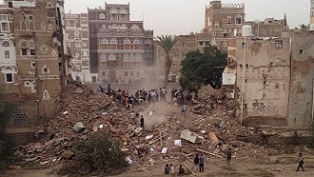Toward Documenting Justice and Remedy of Gross Violations of Yemenis’ Rights

Three years have passed since 2014, and Yemen continues to suffer from the simultaneous instability and armed conflict between the former regime of Ali Abdallah Saleh and the internationally recognized government of Abd Rabbo Hadi, the entry of the Ansar al-Houthi group into armed conflict in support of Saleh`s regime. Since the entry of the Coalition armed forces led by Saudi Arabia into the conflict, in support of the government of Abed Rabbo Hadi in March 2015, more than 18.8 million in need of urgant humanitrian assistance, including 7.3 million on brink of famine, 5,000 civilians, including 1,200 children, have been killed in the last two years, and more than 7,000 people injured. The conflict has displaced 2.4 million people within Yemen, while more than 166,000 have sought refuge outside the country. In addition, the conflict has caused the destruction of infrastructure, while the parties to the conflict have committed serious violations of international human rights law and international humanitarian law, up to and including the displacement of more than 166,000 people in the country as IDPs, reaching the level of war crimes.
A report by the Food and Agriculture Organization of the United Nations (FAO) showed that Yemen is facing the world`s largest food security emergency. Eighty percent of the Yemeni population needs urgent basic assistance, while 14 million people face food insecurity, including 7 million people facing acute food insecurity.
The UN High Commissioner for Human Rights has recommended that the international community establish an independent international body to investigate crimes committed against civilians in Yemen, including targeted killings, recruitment of children in hostilities, and forced evictions and displacement of northerners from the south. Those violations have made Yemen one of the four most-severe humanitarian crises in the world.
This is reflected in Security Council resolution 2342 of February 2017, which recognized that the situation in Yemen continues to pose a threat to international peace and security and the need to implement the recommendations of the comprehensive national dialogue and the Gulf Cooperation Council initiative in a timely manner, taking into account the aspirations of the Yemeni people. In 2014, the Security Council called for the formation of a Committee of Experts to monitor and analyze the deteriorating situation in Yemen and demand that the Committee be allowed to work, access documents, sites and people, in order to take appropriate measures to end the conflict. The Committee of Experts on Yemen submitted its final report to the Security Council in January 2017.
Despite the complexities and the evolution of the political and humanitarian situation, support for transitional justice is indispensable to stop the killing and destruction machine, the consequences of which will continue for generations to come. In that process, essential is documentation of the enormous costs, losses and damages, both material and intangible, to investigate and remedy the grave violations against civilians amounting to war crimes by parties to the conflict.
The prospect of reparations for victims of land grabbing in Yemen emphasizes the need to assume a human rights approach to recording damage. Contributing to the reparation effort, HLRN has been applying its Loss Matrix in three emblematic cases that constitute grave violations in Yemen. This exercise has reaffirmed that transitional justice for the damage to victims of the previous regime and the ongoing war under cannot be repaired by financial compensation alone. More than the material consequences, transitional justice in Yemen will require restoring victims’ lives, as well as building peace and social and political stability.
|